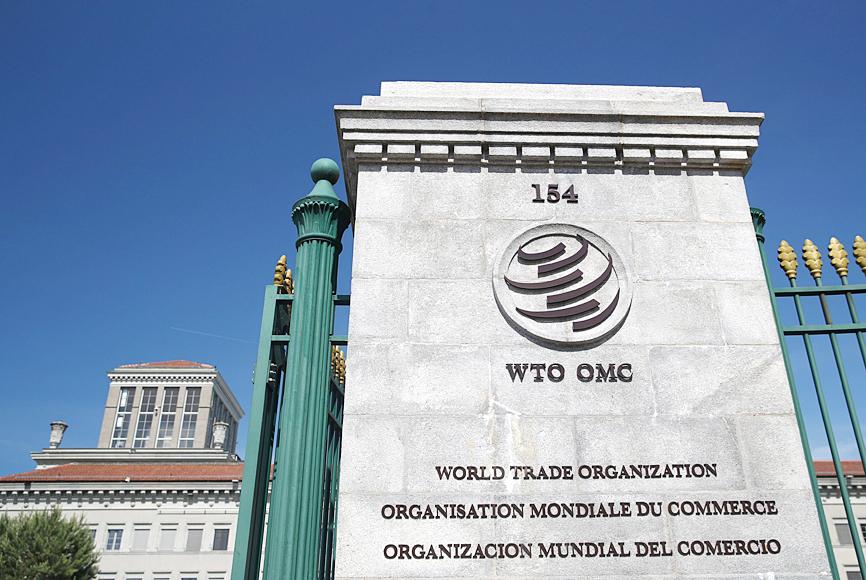The Hong Kong government has been working with China to block Taiwan’s meaningful participation in the WTO, the US Department of State said in a report published on Thursday.
Even as the Chinese government took new measures to erode democracy in Hong Kong, representatives of the territory acted on behalf of Beijing to advance its objectives in the international arena, the report said.
The latest annual Hong Kong Policy Act report, published by the state department and mandated by the US Congress, assessed the state of democratic freedoms in Hong Kong from March last year to last month.

Photo: Reuters
During that period, Beijing moved to disable the role of pro-democracy legislators in Hong Kong’s government and effectively criminalize peaceful political expression critical of the central and local governments, the report said.
The People’s Republic of China (PRC) National People’s Congress Standing Committee approved sweeping changes to Hong Kong’s electoral system, blocking the participation of political groups not favored by Beijing and greatly diminishing Hong Kong voters’ ability to elect representatives of their choice, the report said.
In international affairs, Hong Kong continued to vote separately from mainland China in a number of organizations and multilateral entities, but the extent of the PRC’s influence was unclear, it said.
In some organizations, there were reports that Hong Kong representatives were acting on behalf of China to advance the PRC’s political objectives, the state department said.
It cited reports that in the WTO, of which Taiwan is a member, Hong Kong had been working on Beijing’s behalf to prevent Taipei’s meaningful participation and block it from any leadership positions.
“This indicated that Hong Kong’s ability to participate autonomously in these organizations may be eroding,” the report said.
On the economic front, although Hong Kong’s economic and financial systems remain distinct in many respects from China’s, the differences have narrowed, and business and rule of law risks that were previously limited to mainland China are increasingly a concern in Hong Kong, the report said.

INVESTIGATION: The case is the latest instance of a DPP figure being implicated in an espionage network accused of allegedly leaking information to Chinese intelligence Democratic Progressive Party (DPP) member Ho Jen-chieh (何仁傑) was detained and held incommunicado yesterday on suspicion of spying for China during his tenure as assistant to then-minister of foreign affairs Joseph Wu (吳釗燮). The Taipei District Prosecutors’ Office said Ho was implicated during its investigation into alleged spying activities by former Presidential Office consultant Wu Shang-yu (吳尚雨). Prosecutors said there is reason to believe Ho breached the National Security Act (國家安全法) by leaking classified Ministry of Foreign Affairs information to Chinese intelligence. Following interrogation, prosecutors petitioned the Taipei District Court to detain Ho, citing concerns over potential collusion or tampering of evidence. The

‘FORM OF PROTEST’: The German Institute Taipei said it was ‘shocked’ to see Nazi symbolism used in connection with political aims as it condemned the incident Sung Chien-liang (宋建樑), who led efforts to recall Democratic Progressive Party (DPP) Legislator Lee Kun-cheng (李坤城), was released on bail of NT$80,000 yesterday amid an outcry over a Nazi armband he wore to questioning the night before. Sung arrived at the New Taipei City District Prosecutors’ Office for questioning in a recall petition forgery case on Tuesday night wearing a red armband bearing a swastika, carrying a copy of Adolf Hitler’s Mein Kampf and giving a Nazi salute. Sung left the building at 1:15am without the armband and apparently covering the book with a coat. This is a serious international scandal and Chinese

Seventy percent of middle and elementary schools now conduct English classes entirely in English, the Ministry of Education said, as it encourages schools nationwide to adopt this practice Minister of Education (MOE) Cheng Ying-yao (鄭英耀) is scheduled to present a report on the government’s bilingual education policy to the Legislative Yuan’s Education and Culture Committee today. The report would outline strategies aimed at expanding access to education, reducing regional disparities and improving talent cultivation. Implementation of bilingual education policies has varied across local governments, occasionally drawing public criticism. For example, some schools have required teachers of non-English subjects to pass English proficiency

TRADE: The premier pledged safeguards on ‘Made in Taiwan’ labeling, anti-dumping measures and stricter export controls to strengthen its position in trade talks Products labeled “made in Taiwan” must be genuinely made in Taiwan, Premier Cho Jung-tai (卓榮泰) said yesterday, vowing to enforce strict safeguards against “origin laundering” and initiate anti-dumping investigations to prevent China dumping its products in Taiwan. Cho made the remarks in a discussion session with representatives from industries in Kaohsiung. In response to the US government’s recent announcement of “reciprocal” tariffs on its trading partners, President William Lai (賴清德) and Cho last week began a series of consultations with industry leaders nationwide to gather feedback and address concerns. Taiwanese and US officials held a videoconference on Friday evening to discuss the